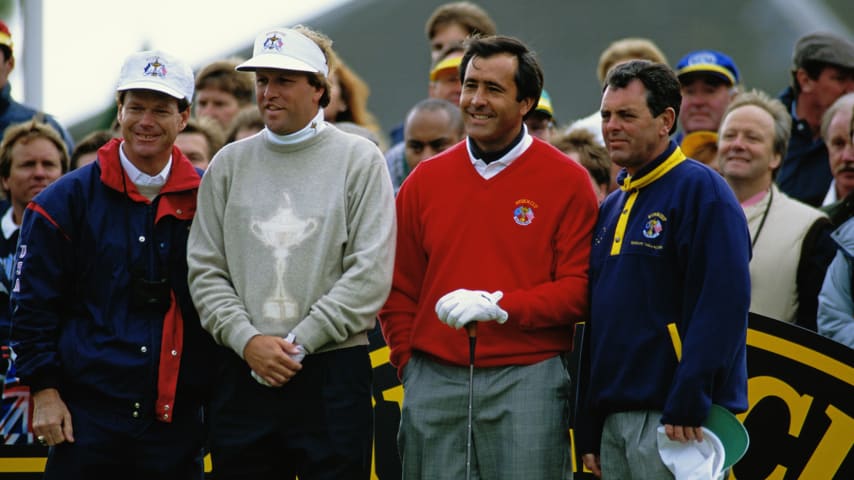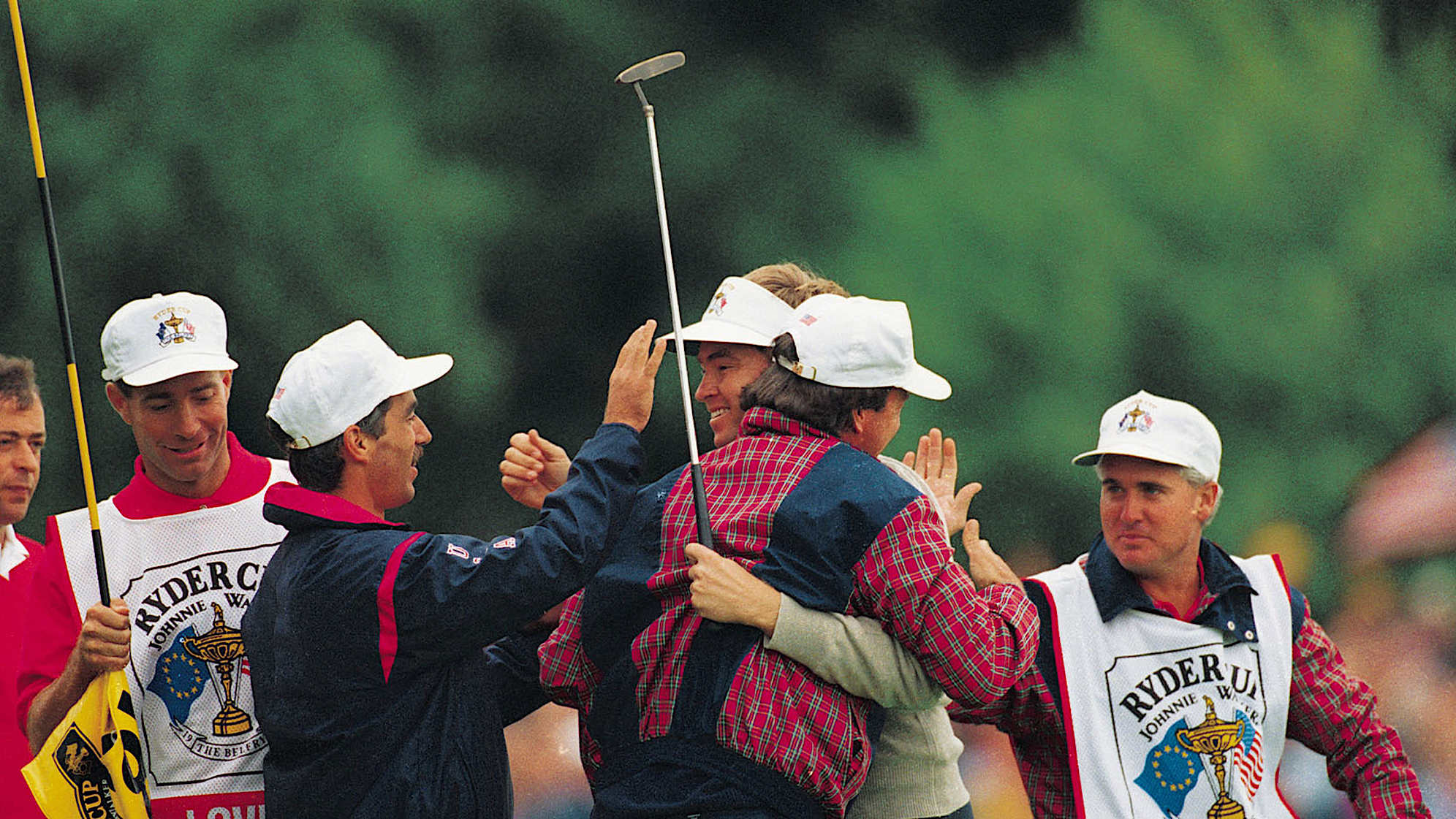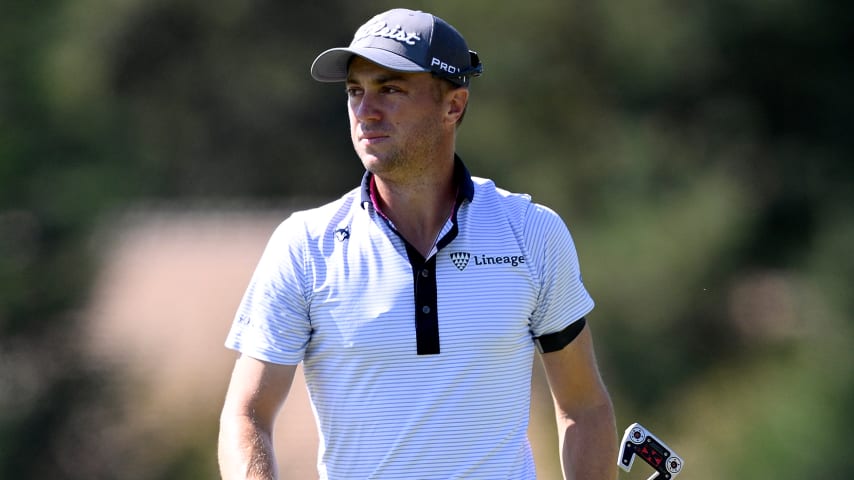U.S. Ryder Cup squad looks to party like it’s ... 1993?
11 Min Read

Ryder Cup golfers (left to right) U.S. captain Tom Watson, Jim Gallagher Jr., Seve Ballesteros and European captain Bernard Gallacher at The Belfry, Warwickshire in 1993. (Getty Images)
Written by Jeff Babineau
For Jim Gallagher Jr., competing on a winning U.S. Team in his first (and only) Ryder Cup appearance in 1993 was a lofty career accomplishment. Already he had won once on the PGA TOUR earlier in the ’93 season (Anheuser-Busch Golf Classic), and soon after the Ryder Cup he would add the TOUR Championship at the prestigious Olympic Club, the signature victory of his career.
Back then, the U.S. was accustomed to winning Ryder Cups overseas, though the 1993 venue, The Belfry in England, had been a puzzle the U.S. Team previously had difficulty solving. It tied a Ryder Cup against Europe there in 1985 and lost one in 1989. Still, the U.S. closed emphatically in ’93, winning six points in its last seven singles matches and cementing a 15-13 triumph. It wasn’t until the Concorde touched down back on U.S. soil with that 17-inch cup in tow that the full meaning began to resonate with Gallagher.
When he finally stepped through his front door at home, his 2-year-old daughter, Mary Langdon, was sporting a t-shirt that read: “My Daddy beat Seve,” a cute nod to Gallagher’s 3-and-2 singles victory over legendary Spaniard Seve Ballesteros. Gallagher, now an analyst at Golf Channel, looks back and considers beating Ballesteros the pinnacle of his golf career.
“It took my confidence to a whole new level,” Gallagher said last week.
When a new U.S. Team, filled with new players and led by a new captain, gets to work in Italy this week at the 44th Ryder Cup, which begins Friday at Marco Simone Golf & Country Club, the U.S. will be seeking the team’s first victory on foreign soil since that win in 1993.
Thirty years.
You want perspective? Gallagher’s “little girl” is now 31 and a mom herself. Gallagher is a grandfather. Raymond Floyd, who played on that 1993 U.S. side as one of Tom Watson’s two captain’s picks, turned 81 this month. Five members of this week’s U.S. team were not yet born. (Justin Thomas joked he has a hard time remembering the ’93 Ryder Cup – he was 5 months old.)
Six times over the last three decades the U.S. has taken a swing at winning the Ryder Cup in Europe, and six times the U.S. has swung and missed. The team lost in Spain in 1997, at Valderrama, where the home captain, the late Ballesteros, seemed to travel the course by jetpack. They lost in a return to The Belfry in 2002, falling 15.5-12.5 after the competition was delayed a year by the tragic events of 9/11. They got thumped in Ireland (K Club) in 2006, lost a close match in muddy, rain-soaked Wales (Celtic Manor) in 2010, and hit a low point in Scotland (Gleneagles) in 2014, losing by five and prompting the formation of a Ryder Cup Task Force and revised structure giving more control/say to players. The Americans then turned up in Paris five years ago not fully prepared for the challenge, and Europe won again, 17.5-10.5.
C’est la vie.
In Paris, Tiger Woods and Phil Mickelson – each most likely competing in his final Ryder Cup – went without a point in six matches (0-6-0). The big guns just didn’t fire, which is one of many themes that have contributed to a troubling 30-year U.S. drought on the road in this biennial competition. Some seem minute, almost trivial (time zone adjustment). Some seem to be gut feelings. The result simply has more repercussions and thus more meaning for Europe – a reality, not a suggestion that Americans don’t care, because clearly they do. Other impediments to winning have repeated themselves.
On the heels of a dominant 10-point U.S. victory at Wisconsin’s Whistling Straits two autumns ago, Davis Love III, a former two-time captain and now assistant to Zach Johnson, admitted the U.S. Team just wasn’t ready in Paris at Le Golf National. Truthfully, that admittance was no different than nearly a quarter-century earlier in Spain, when U.S. Captain Tom Kite lamented after defeat that his team didn’t know Valderrrama nearly as intimately as it should have. Two weeks ago, nine U.S. team members visited Marco Simone to scout it out.
“In Paris, we had a couple of star players who didn’t play well, and we had a golf course (Le Golf National, home to the DP World Tour’s French Open) that – not making excuses – we didn’t do a good job preparing for that golf course,” Love said. “We didn’t know it. It’s a different deal, and every year, we need to know what we need to do different.”
Times change. At Whistling Straits, for instance, the U.S. not only had its own gym, but brought eight trainers for 12 players. Not making excuses is a familiar refrain encountered when speaking to American players and captains about its less-than-stellar run of late in this competition. Since Continental Europe joined the once lopsided fray in 1979 (at the time, it was the U.S. against Great Britain/Ireland – thank you for the suggestion, Jack Nicklaus), Europe owns a winning Ryder Cup record. As a team, Europe is 11-9-1, and 9-4-0 since last losing at home in 1993. (All-time, the U.S. remains 27-14-2, something the fuels Europe’s fervent drive to catch up.)
Since ’93, Europe has won three Ryder Cups in the U.S.: at Oak Hill (1995), Oakland Hills (2004) and Medinah (2012), where it roared back from a 10-6 deficit (10-4 at one point late Saturday).
In an event with razor-thin margins, winning on the road has become a tall and challenging task.
“I've said this for a while, I think one of the greatest accomplishments in our game now is to win an away Ryder Cup,” said Europe’s Rory McIlroy, who, at 34, will take part in his seventh Ryder Cup. “I think with just how partisan it's become in terms of having a home field advantage, being able to set the golf course up in a way that benefits your team, I think the next team that wins a Ryder Cup on foreign soil, I think it's a huge accomplishment.
"We weren't supposed to win in '12 (at Medinah, outside Chicago). Ever since then, the home team has won, each time pretty convincingly."
In four matches following Medinah, the home team in the Ryder Cup has won by an average of 7 points. The home team controls the golf course until tournament week begins and definitely holds an edge, just the way an NFL team performs better at home. Italy and Marco Simone represent a first-time venue, but traditionally, the home crowd in Europe relishes cheering for their David over golf’s Goliath.
“I would compare it to being in Vegas,” said Paul Azinger, a winning U.S. captain in 2008 (at home) who will be calling this week’s matches on NBC. “There’s only a 1% advantage in blackjack, but they’re building some pretty nice hotels on it. A 1% edge, you can give Europe that 1% edge, you can give them a one and a half percent advantage before we tee it up, for a multitude of reasons.”
Odds-wise, the U.S. Team has been established as favorites in this Ryder Cup, all past history aside, thought the gap has narrowed in the months leading up to Marco Simone. The average world ranking for the 12 U.S. players is 12.92; for Europe, it’s 29.25. Europe has three players from outside the world top 50, though two of them – rookies Ludvig Aberg (80) and Nicolai Hojgaard (81) – are in their early 20s and just getting started.
On paper, the U.S. always seems to be the favorite, though, in this competition, as Azinger muses, “Europe should always be the favorite.” Europe, as 2006 U.S. Team Captain Tom Lehman once noted in defeat, seems to always find a way to play above the sum of its parts. It’s not a swipe as much as it is an acute observation. When he returned to playing the PGA TOUR after his team lost handily in Ireland, Lehman was asked to pinpoint what he had learned from the week.
“When we missed a green, we were trying to get up-and-down,” Lehman said. “When they (Europe) missed a green, they were trying to chip in.”
Curtis Strange, who has seen the Ryder Cup as a competitor, captain (his team lost at The Belfry in 2002) and broadcaster, looks at this 30-year window without a U.S. road victory and quickly gives generous credit to the heady play, and grittiness, of Europe. Strange will be one of several former U.S. captains who will be in Italy this week. Losing is something that never sat well with the two-time U.S. Open champion.
“Every time you step on that first tee – I don’t care if it’s for a $2 Nassau in a practice round or the Ryder Cup at The Belfry – you want to win,” Strange said. “You want to beat this guy that you’re head-to-head against. I’m at a loss like everybody else out there, and I’ve thought a lot about it.
“I don’t think we’ve played up to our standards, for some reason. Maybe it’s the pressure, maybe it’s match play. Maybe we’re not invested over there emotionally as much as we should be. I don’t know. I can’t answer that question. Go back to the start of all those weeks. I don’t know if we were the favorite every time, but we certainly have a deep talent field, and we get beat. So why?”
A couple of glaring factors: In losing its last six Ryder Cups on the road, the U.S. has captured the singles session only once (7-5 in Wales in 2010, after entering the final day trailing by three). Europe has sailed on the winds of surprising momentum swings of such upsets as Italy’s Costantino Rocca over Woods in ’97, or Wales’ unheralded Phillip Price, No. 119 in the world at the time, taking down No. 2 Mickelson at The Belfry in ’02.
Europe produces Ryder Cup heroes seemingly off some assembly line in Switzerland – from Price to Sergio Garcia to Ian Poulter to Francesco Molinari, who was 5-0 in Paris – while the U.S. has to reach all the way back to Lanny Wadkins (20-11-3) to find its last “great” Ryder Cup player. Wadkins played in his last Ryder Cup in 1993. Thomas, a captain’s pick on this week’s U.S. team, is off to a promising start (6-2-1) in his two Ryder Cups.
Woods (eight Ryder Cups, an overall record of 13-21-3), Mickelson (12 cups, 18-22-7) and Furyk (nine cups, 10-20-4) – who entered the 2006 Ryder Cup as world Nos. 1, 2 and 3, respectively – played in 29 combined Ryder Cups and appeared in 118 matches, but won at about a 40% clip. Those three always carried extra pressure and scrutiny. All three played on a winning U.S. side in 1999 at Brookline, near Boston, and Mickelson and Furyk were on Azinger’s winning team in 2008, which Woods missed because of injury. None ever won a road Ryder Cup.
In the U.S. team’s favor this week: These are new players and a new team that, together, is 0-0. The U.S. brought four rookies to Italy. Of the eight plyers with Ryder Cup experience, only four have played on a losing team in Europe. Rickie Fowler (3-7-5) is the only player without a winning overall record. For that reason, Ryder Cup rookie Wyndham Clark, born two months after the U.S. won at The Belfry in 1993, said he gladly will lean on “a little bit of ignorance.”
Of the eight U.S. players who never have competed in a road Ryder Cup, the slate is clean, the road open, the opportunity large.
“We watched the team lose, but we don’t know how to lose,” Clark, this summer’s U.S. Open champion, said on a recent Sports Illustrated podcast. “A lot of us are winners. We’ve won at every level. A lot of guys have won a national championship for their college team. They've played on winning Walker Cup teams. The guys who were at Whistling Straits (in 2021) won. So we’re treating it like, ‘We don't know what we don't know.’”
Their captain, Johnson, may have some residual scar tissue left from three losses in road Ryder Cups, but he appreciates the energetic and enthusiastic approach of his first-timers. That may be a huge plus this week for his team in Italy.
So, Johnson was asked point-blank by an Italian reporter on Monday at Marco Simone, why hasn’t the U.S. been able to get the job done away from home over all these years?
“It’s difficult. It’s hard to win outside of your comfort zone,” Johnson said. “It’s hard to win against a team that has been very, very formidable. It’s really just that simple. ... I know what history says. I’m very aware of that. At the same time, I can speak confidently in talking to my team ... these guys are ready and want to embrace that difficulty and want to just look at this as a great opportunity.
“The teams of the past are the teams of the past. This is a new opportunity.”
A chance over three days to put 30 years behind them.















